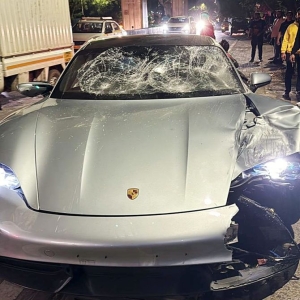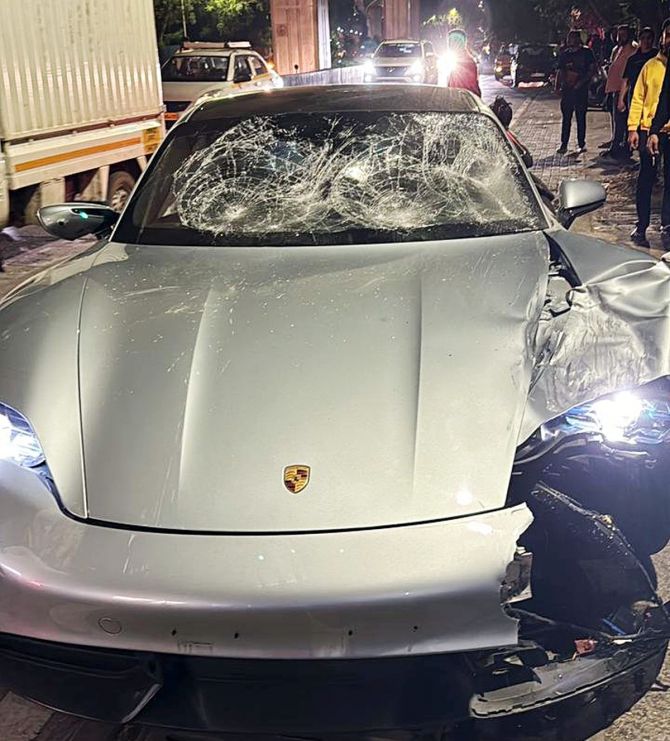
.png) Jaswant Kaur
Jaswant Kaur

In the wee hours of last Sunday morning, two people lost their lives in a road accident. They had been colleagues for a long time and had gone out for dinner. One of them had planned to return to her hometown. What should have ended in a lot of fun, laced with beautiful memories, had a tragic end.
Both of them were on a bike when a 17-year-and-eight-months-old boy, heavily intoxicated, hit them with a new Porsche! Yes, a boy was given such a luxurious car to drive at a young age! Needless to say, he didn't have a driving licence. Also, the vehicle was not registered with the RTO despite being bought in March. The boy's realtor father had not paid the Rs. 44 lakh road tax, flouting the rules that a responsible citizen must comply with. That is why the car did not have a number plate.
The father gave the boy the vehicle and allowed him to drink and go out with his friends to celebrate his achievement in the higher secondary examination. A sensible father would never allow that to happen. When the boy was taken into custody, the father ran away and was finally detained after a day in Maharashtra's Chhatrapati Sambhajinagar, also known as Aurangabad.
The man has now been booked under the provisions of sections 75 and 77 of the Juvenile Justice Act for allowing his minor son to drive the Porsche and consume liquor. Section 75 deals with "wilful neglect of a child, or exposing a child to mental or physical illnesses," while section 77 deals with supplying a child with intoxicating liquor or drugs.
The First Information Report states that "the man, despite knowing his son did not have a valid driving licence, gave him the car, thus endangering the latter's life, and allowed him to party even as the father knew that he consumed liquor." Besides the father, the police also arrested the restaurant owner and the hotel manager, who served liquor to a juvenile. The boy was released on bail with the condition that he work with the traffic police for 15 days and write an essay on road safety, which raised many eyebrows.
The juvenile justice board did not consider the severity of the crime committed or the latest amendments to the Juvenile Justice Act. The amended law provides that a juvenile in the age group of 16 to 18 years can be tried as an adult, depending on the nature of the crime. The juvenile justice board was given the power to determine whether the juvenile should be tried as a minor, a child, or an adult. This provision was introduced during the 2012 Delhi Nirbhaya gang rape, in which one of the accused was just short of 18 years of age and was tried as a juvenile.
To our utter dismay, the Juvenile Justice Board did not find the crime serious enough. Two people lost their lives, and yet the crime is not considered serious enough! The treatment given to the boy was highly criticised by the general public. In fact, the police were compelled to file an appeal against the order in court. The juvenile justice board again took up the matter, cancelling the bail.
Unfortunately, the law took its course only when people started criticising the decision. We have already seen in the past how people have exploited loopholes in the law to their advantage even though their mental age is much above or closer to that of an adult.
This case has undoubtedly raised questions about our value system, legal machinery, and how children/juveniles conflict with the law. While technology has changed how we think and look at our lives, it is equally important that its excessive exposure to children can be counterproductive.
Our legal system has been developed to ensure children's best interests in every possible manner. However, the first step towards achieving this begins at the family level. People with ample resources do not realise the ill effects of giving access to such luxuries at such a tender age when children are not mature enough to make informed decisions. Nor do they have enough information to understand the implications of a decision taken in haste.
The data published by the National Crime Records Bureau (NCRB) a few months ago is disturbing. 31,170 cases were registered against juveniles in 2021, an increase of 4.7 per cent over 2020, when 29,768 cases were registered. Most of them, 76.2 per cent, were in the 16—18 age group. In other words, many more children are coming into direct conflict with the law year on year.
Recently, the Supreme Court expressed concern over the "rising rate of juvenile delinquency," questioning "whether the (Juvenile Justice) Act, 2015, has subserved its objective. We have started gathering an impression that the leniency with which juveniles are dealt with in the name of the goal of reformation is making them more and more emboldened in indulging in such heinous crimes." The indictment is as severe against juveniles as against the state for failing to carve out an effective reform and rehabilitation policy for young offenders.
Research shows that during adolescence, a child's brain undergoes significant changes, especially in the areas that lead to impulse control, response inhibition, and decision-making. This means that juveniles may not understand the consequences of their actions or may be unable to resist impulses like adults. The tendency to take impulsive actions may increase at times when they are experiencing heightened emotions and stress.
Most of the time, their behaviour is influenced by the environmental factors they are surrounded by. An abusive environment, broken family relations, or extreme indulgence in wealth and carelessness certainly affect their behaviour, making them more vulnerable and prone to committing crimes.
As adults, whether as parents, teachers, mentors, guides, friends, or in any other relationship we have with them, it becomes our responsibility to help them develop essential life skills like critical thinking, decision-making, and a growth mindset so that they can understand the consequences of their decisions.
Without this guidance or mentorship, we only fail ourselves and our children. It is in the best interest of society at large that our children are provided with a conducive and positive environment to grow. Otherwise, what happened in Pune could occur in any of our families!